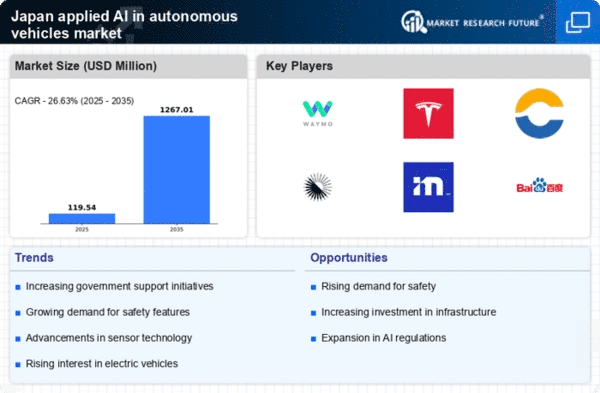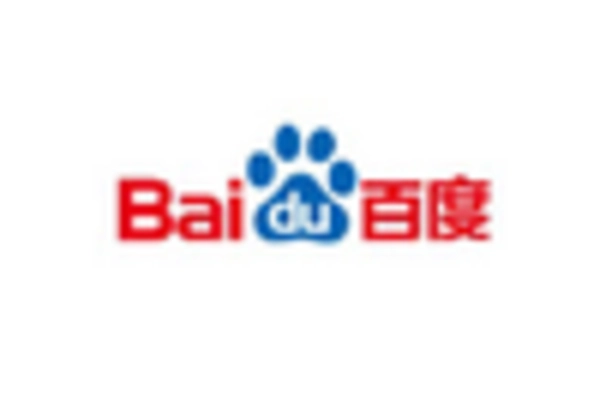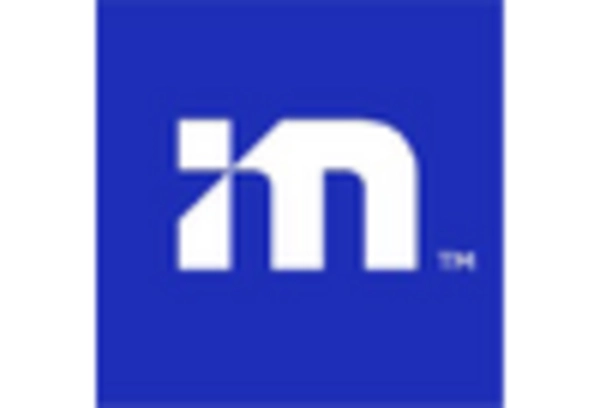Partnerships and Collaborations
Partnerships and collaborations among technology firms, automotive manufacturers, and research institutions are emerging as a key driver in the applied ai-in-autonomous-vehicles market. In Japan, companies are increasingly forming alliances to leverage each other's expertise in AI and automotive technologies. For example, collaborations between tech giants and traditional automakers have resulted in the development of cutting-edge autonomous systems. These partnerships not only accelerate innovation but also share the financial burden of R&D, making it more feasible for companies to invest in advanced AI solutions. As these collaborations continue to grow, the applied ai-in-autonomous-vehicles market is expected to expand, fostering a competitive landscape that encourages the development of innovative technologies.
Technological Advancements in AI
The applied ai-in-autonomous-vehicles market in Japan is experiencing rapid technological advancements, particularly in AI algorithms and machine learning techniques. These innovations enhance vehicle perception, decision-making, and navigation capabilities. For instance, the integration of deep learning models allows vehicles to interpret complex environments more effectively. As of 2025, the market is projected to grow at a CAGR of approximately 15%, driven by these technological improvements. Furthermore, Japanese companies are investing heavily in R&D, with expenditures reaching over $1 billion annually, indicating a strong commitment to advancing AI technologies in autonomous vehicles. This focus on innovation is likely to propel the applied ai-in-autonomous-vehicles market forward, as companies strive to develop safer and more efficient transportation solutions.
Government Initiatives and Funding
In Japan, government initiatives play a crucial role in shaping the applied ai-in-autonomous-vehicles market. The Japanese government has allocated substantial funding to support research and development in autonomous technologies, with investments exceeding $500 million in recent years. These initiatives aim to foster innovation and ensure that Japan remains a leader in the global automotive industry. Additionally, regulatory frameworks are being established to facilitate the testing and deployment of autonomous vehicles on public roads. This supportive environment encourages collaboration between private companies and government entities, which is essential for the growth of the applied ai-in-autonomous-vehicles market. As a result, the market is likely to benefit from increased funding and streamlined regulations, promoting further advancements in AI applications.
Consumer Demand for Safety Features
Consumer demand for enhanced safety features is a significant driver of the applied ai-in-autonomous-vehicles market in Japan. As awareness of road safety increases, consumers are increasingly seeking vehicles equipped with advanced AI technologies that can prevent accidents and improve overall driving experiences. Surveys indicate that over 70% of Japanese consumers prioritize safety features when purchasing vehicles, which has led manufacturers to invest in AI-driven safety systems. These systems utilize real-time data analysis to detect potential hazards and make split-second decisions to avoid collisions. Consequently, the applied ai-in-autonomous-vehicles market is likely to expand as manufacturers respond to this growing consumer preference, integrating more sophisticated AI technologies into their offerings.
Urbanization and Traffic Congestion
Japan's rapid urbanization and increasing traffic congestion are driving the applied ai-in-autonomous-vehicles market. As urban populations grow, the demand for efficient transportation solutions becomes more pressing. Autonomous vehicles equipped with AI can optimize traffic flow and reduce congestion by utilizing real-time data to make informed routing decisions. In major cities like Tokyo, where traffic congestion costs the economy an estimated $10 billion annually, the potential for AI-driven solutions is substantial. The applied ai-in-autonomous-vehicles market is likely to benefit from this trend, as urban planners and policymakers recognize the need for innovative transportation solutions to address these challenges. This shift towards autonomous vehicles may lead to a more sustainable urban environment, further propelling market growth.
















